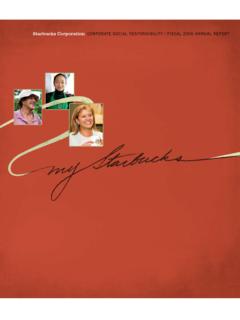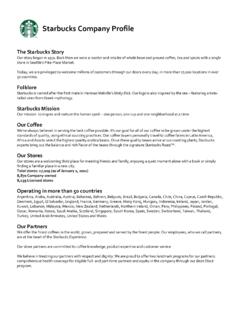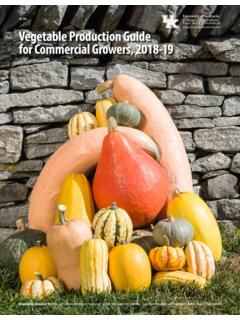Transcription of GLOBAL SOCIAL - globalassets.starbucks.com
1 GLOBALSOCIALIMPACTREPORTSTARBUCKS 20182018 STARBUCKS GLOBAL SOCIAL IMPACT REPORT | 2 THE PURSUIT OF DOING GOODINTRODUCTIONREFLECTING ON OUR PROGRESS IN 2018 From the first time Starbucks opened its doors in Seattle s Pike Place Market in 1971, we have been dedicated to exceptional coffee and customer service and something more. It started with our early travels to the places where our coffee is grown, understanding that our future is inextricably tied to the futures of farmers and their families. We nurtured personal relationships and built a GLOBAL network of support to create a new way to produce coffee: one that is sustainable, transparent and good for people and the planet. As the threats of climate change have grown, we have been working to help coffee farms adapt and find innovative solutions in how we build and operate our stores, while reducing the environmental impact of our cups, straws and stores are often the heart of a neighborhood, and we strive to make each one a welcoming and inclusive Third Place.
2 As we have grown, so too has our opportunity to make a positive impact, from alleviating hunger through our food donation program to making investments in local partnerships and coffee- and tea-origin communities through The Starbucks all these efforts together is a common thread a green thread one that is woven in the fabric of our company by the more than 300,000 men and women who proudly wear the green apron. We are dedicated to making our partners proud, providing pay equity and investing in their success. And we are working to hire veterans and military spouses, refugees, Opportunity Youth and those formerly incarcerated, and helping them build their futures once they are with it has been from the beginning, our purpose goes far beyond profit.
3 We believe in the pursuit of doing good. This report serves as a transparent acknowledgement of our efforts: where we have achieved and where we have fallen short, and the work still to come. As we look ahead to our centennial anniversary 50 years from now, we hope to build an enduring company by staying true to Our Mission and Values, embracing new ideas and innovating in ways that are meaningful to our customers and inspiring to our partners. We hope you will continue to join us on this STARBUCKS GLOBAL SOCIAL IMPACT REPORT | 3 IMPACTSUMMARYLEADING IN SUSTAINABILITY2018 RESPONSIBLE COFFEEOur vision is simple: to produce sustainable coffee, served sustainably. For more than two decades, Starbucks has partnered with Conservation International on Practices, our ethical coffee sourcing program.
4 We now source 99 percent of our coffee this way, promoting quality, economic transparency and SOCIAL and environmental impact with a vision to make coffee the world s first sustainable agricultural product in the change represents significant immediate and long-term risks to coffee farmers around the world, and we are taking steps to help ensure the supply of high-quality coffee for future generations. Core to ensuring the long-term sustainability of coffee is also ensuring the economic profitability for farmers. We are investing in innovation to offer farmers new climate-resilient coffee tree varietals and support coffee-farming communities through our GLOBAL Farmer Fund to make sure farmers have access to low-interest financing that will help them reinvest in their farms.
5 We continue to share what we have learned with others through agronomy training for farmers, whether they sell to us or not. We are also supporting women and families in coffee- and tea-growing communities through Starbucks Foundation Origin Grants that are focused on strengthening their leadership skills and income-generating activities to diversify their re also working toward a goal of 100 percent ethically sourced tea and cocoa for beverages by 2020. We are investing in sustainability, issuing our third sustainability bond in May 2019 for investors to participate in socially and environmentally focused projects and leveraging new technology to bring real-time digital traceability to our coffee supply CUPS AND PACKAGINGT here is perhaps nothing more recognizable for the Starbucks brand than our cup.
6 Yet our cups and packaging remain one of our biggest environmental challenges. We are looking for new ways to promote reusable cups and better manage the lifecycles of disposable ones. We are testing a variety of greener cups that are both recyclable and compostable in select cities through the NextGen Cup Challenge and are launching a lightweight strawless lid with a hope to eliminate 1 billion single-use plastic straws annually. Over the past decade we have struggled with our goal to significantly increase the use of reusable cups in our stores. We are continuing to test new ideas and approaches to the challenge. In the UK we conducted a trial of a 5-pence disposable cup fee and a 25-pence reusable cup incentive, which increased reusable cup usage for hot drinks sold in stores nationwide from to percent.
7 Starbucks is invested in developing solutions that seek to improve the sustainability of their products. When companies begin to rethink their plastic footprint, innovation, research and measurement are the key elements needed to set them on a path toward continuous improvement, said Erin Simon, Director of Sustainability R&D at the World Wildlife STORESWe know that designing and building green stores is not only environmentally responsible, it is good business. We already operate more than 1,600 LEED-certified stores around the world, making us the world s largest green retailer. We are building on that legacy by developing a new Greener Store framework for 10,000 stores globally by 2025, which could save $50 million in utilities costs over the next 10 years.
8 And we re empowering our partners to help us in that effort by offering sustainability certification through our Greener Apron POWEROver the past two years, Starbucks has committed to more than $140 million in renewable energy to power our stores, reducing our environmental impact and supporting access to green power. It s enough to power 100 percent of our more than 9,000 company-operated stores in the United States, and 77 percent of our GLOBAL operations. We plan to locally source more than 50 percent of our renewable energy in the by 2020, including from our new solar farm in North Carolina, which delivers enough clean energy to power the equivalent of the energy consumed by 600 Starbucks stores. And we are partnering with developers to bring new projects online, including a wind farm planned near Olympia, Wash.
9 , and a new wind farm in Illinois that will power 360 stores in that state, including the future Chicago STARBUCKS GLOBAL SOCIAL IMPACT REPORT | 4 IMPACT SUMMARYETHICALLY SOURCED COFFEEETHICALLY SOURCED TEACOFFEE & TEAGoal 100% ethically sourced coffeeDescription For the fourth year in a row, more than 99% of our coffee was verified as ethically sourced under Practices that s nearly 650 million pounds of it. Although we are constantly striving for 100%, it s that last 1% where some of our most important work happens, bringing on new farmers and cooperatives to help ensure the long-term future of 100% ethically sourced tea by 2020 Description Our tea is verified as 95% ethically sourced by third-party organizations including the Ethical Tea Partnership and Rainforest Alliance to ensure the tea Starbucks sources is produced with sustainable practices and under safe and humane working Train 200,000 coffee farmers by 2020 Description Our expert agronomists have provided free training to 52,240 coffee farmers through our nine farmer support centers in coffee-producing countries around the world in the past two years, including 27,938 in 2018.
10 We will explore new ways to further scale our Invest $50 million in farmer loans by 2020 Description In 2018, loans reached thousands of farmers in 14 countries to strengthen their coffee farms through tree renovation and infrastructure Provide 100 million trees to farmers by 2025 Description Starbucks has donated more than 31 million coffee trees over the past three years ( million in 2018) to farmers in Mexico, Guatemala and El Salvador. These climate-resilient trees replace ones that are declining in productivity due to age and disease, such as coffee leaf TRAINEDINVESTED IN FARMER LOANSTREES DISTRIBUTED TO FARMERS52K+$ IN SUSTAINABILITY2018 STARBUCKS GLOBAL SOCIAL IMPACT REPORT | 5 IMPACT SUMMARYFEWER STRAWS70%*POST-CONSUMER FIBERBEVERAGES SERVED IN PERSONAL CUPSNEW CUP TECHNOLOGIESMAJOR CITIES CURRENTLY RECYCLE OUR CUPSGoal Double the recycled content of our cups by 2022 Description Our hot cups currently contain 10% post-consumer fiber (PCF)











